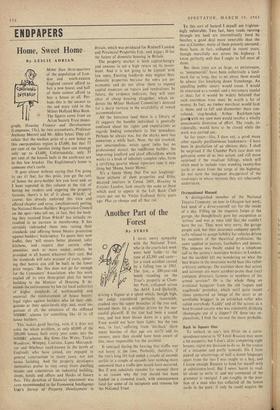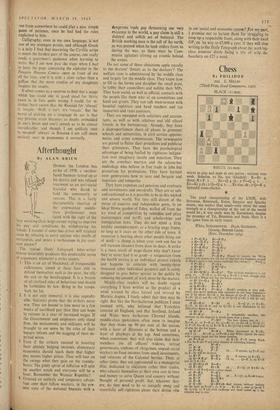Another Part of the
Forest
By STRIX
I HAVE every sympathy j with the National Trust, who in the courts last week were held liable—to the tune of £2,500 and costs— for a road accident caused
• by a falling tree in 1961. The tree, a 200-year-old beech 'standing on the Trust's property at Clum- ber Park, collapsed across the A614. Lord Dalkeith, driving a Jaguar at a speed which, though high, the judge considered perfectly reasonable, crashed into the upper branches of the tree and, beyond them, hit a minibus driven by the suc- cessful plaintiff. If the tree had been a sound tree, and had been blown down in a gale, the Trust would not have been liable; but the tree was, in fact, suffering from 'die-back' (how many beeches of that age are not?) and its owners, since they should have been aware of this, were responsible for the accident.
It emerged during the hearing that traffic was not heavy at the time. Probably, therefore, if the tree's long life had ended a couple of seconds earlier or a couple of seconds later nothing more untoward than a traffic jam would have occurred.
But if you substitute minutes for seconds there is no reason why the tree should not have landed on a crowded coach, with consequences fatal for some of its occupants and ruinous for 'the National Trust.
To this sort of hazard I myself am frighten- ingly vulnerable. Two fast, busy roads running through my land are intermittently lined by beeches a good deal more venerable than the one at Clumber, many of them patently unsound; three have, in fact, collapsed in recent years, though mercifully not across the highway. I know perfectly well that I ought to fell most of them.
But these trees are so large, so picturesque, so 'immemorial,' have been collectively a land- mark for so tong, that to set about them would be almost like knocking down Stonehenge. An appalling public outcry would ensue. I would be execrated as a vandal, and a mercenary vandal at that; for it would be widely believed that such enormous trees must be worth a lot of money. In fact, no timber merchant would look at them, and to fell and dismember these con- voluted, stag-headed, Arthur Rack ham-type giant$ with my own men would involve a wholly uneconomic diversion of effort. The roads, in- cidentally, would have to be closed while the work was carried out.
So for years—like, I dare say, a good many other equally pusillanimous landowners—I have been in dereliction of an obvious duty. I shall be surprised if the Clumber Park case does not galvanise some of us into action, and still more surprised if the resultant fellings, which will often need to include trees standing twenty-five yards or more from the verge of the highway, do not earn the indignant disapproval of the road-users in whose interests they are reluctantly undertaken.
Occupational Hazard A distinguished member of the National Theatre Company, on tour in Glasgow last week, had need of a drive-yourself car for the inside of a day. Filling up the requisite forms at the garage, she thoughtlessly gave her occupation as 'actress' and was at once told that she couldn't have the car. They were very sorry, the garage people said, but their insurance company specifi- cally refused to accept liability for vehicles driven by members of the theatrical profession; the same applied to jockeys, footballers and miners. The impasse was finally ended by a telephone call to the actress's insurance brokers in London; but the incident left me wondering on what the best brains in the insurance world base this rather arbitrary embargo. Do statistics .show that actors and actresses are more accident-prone than (say) company directors, farmers or members of the armed services? Or is the whole thing an irrational hangover from the old 'rogues and vagabonds' prejudice, which until quite recent times sponsored an image of the actor as an unreliable braggart in an astrakhan collar who called everybody Toddy' and of the actress as a bird-brained cocotte who was constantly drinking champagne out of a slipper? Of these two ex- planations, I find the second the more probable.
Back to Square One
To embark in one's late fifties on a corre- spondence course in '0' Level Russian may seem a bit eccentric, but I don't, after completing eight lessons, regret my decision to do so. In the course of a misspent and partly nomadic life I have picked up smatterings of half a dozen languages apart from the two I was taught as a boy, and I know enough Russian to fend for myself with at subsistence-level. But I never learnt to read, let alone to write it, and my command of the grammar is vestigial. I am roughly in the posi- tion of a man who has collected all the lowest cards in the pack; if only he could acquire the rest from somewhere he could play a nice. simple game, of patience, once he had had the rules explained to him.
Calligraphy, even in my own language, is not or e of my strongest points, and although Greek is a help I find that mastering the Cyrillic script is much the hardest part of the course; one really it( eds a governess's guidance when learning to w rite. But I am now past the stage when I had to have the page containing the alphabet in the Pt noin Russian C'ourse open in front of me al I the time. and it is with a titter rather than a gt ffaw that the more erudite of my daughters in spects the results.
It often comes as a surprise to find that a usage which has stood one in good stead for thirty years is, in fact, quite wrong. I could, for in- stance, have sworn that the Russian for 'always' is 'svegeln. Well, it isn't: it's 'ysegda.' But the worst of picking up a language by ear is that any 'pristine error becomes So deeply embedded in one's brain and one's speech as to be almost ineradicable: and though I am unlikely ever to misspell 'always' in Russian I am still more unlikely ever to pronounce it correctly.



































 Previous page
Previous page